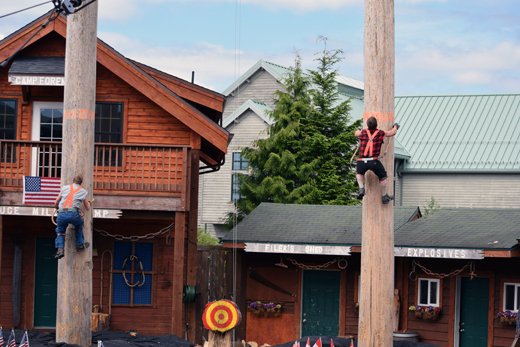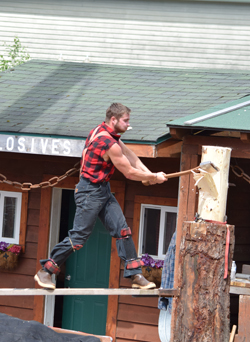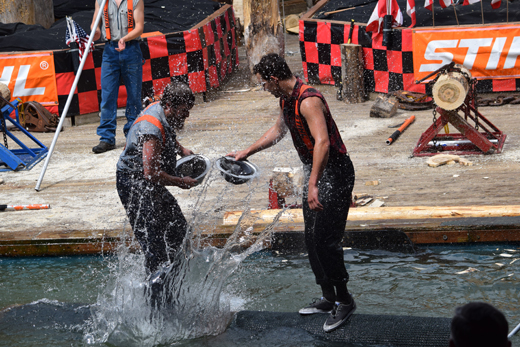
By Donald H. Harrison


KETCHIKAN, Alaska – A lot of Americans find themselves seemingly rooting for a Canadian team against an American one, and vice versa, during the “competition” at the Great Alaskan Lumberjack Show, but it’s all in fun with no real assault on national pride actually intended.
Audience members on the right side of the stage are asked to cheer for their team, which turns out to be Canadian, while those on the left side of the audience are asked to root for their team, the Americans.
Not just cheer, mind you, but to demonstrate loudly in celebration of victories, and to boo lustily whenever athletes of the other team act like they are just too big for their britches. Fans who cheer, jump, and yell most convincingly are awarded a prize in the form of a portrait postcard signed by their team’s lumbering athletes. Just ask my enthusiastic grandchildren Brian, 10, and Sara, 8, who triumphantly took away a postcard each after separate events, prompting their father, David, to comment that the event was one of the highlights of our family’s Alaska trip. “My kids liked it,” he explained. “They were happy watching it.”
Another grandchild, Sky, 12, who was among our group of eight on a family vacation, said in addition to the entertainment, he liked the fact that the lumberjack program came with some local coupons. However, given Canadians’ international reputation for being unfailingly nice and courteous, Sky suggested that the “Canadian” side of the audience should have cheered for all the competitors, not just their team. Sky’s older brother, Shor, 18, was taken with a plush Big Foot that was on sale at the lumberjack show’s gift shop.
Sky’s and Shor’s mother, Sandi, said that by engaging the audience, the lumberjack event became not just a mere demonstration of skills, but a memorable event which “the audience bought into.” And “Grandma,” as my wife Nancy often was called during this trip, pronounced the lumberjack show to be “cute, interesting.”
The lumberjack competition is a fine introduction to the high spirits that Alaskans like to show to tourists, a combination of braggadocio and pride in being able not just to survive, but to thrive, in a state
where the elements can be harsh, and where self-reliance, physical fitness, and a sense of humor can become necessary assets.
I began to suspect that the athletes – who mock quarreled with each other to keep us entertained – also were keeping the score closer than otherwise might have occurred, so as to build the suspense through chopping, sawing, pole climbing, and other events of skill until the show came, with a tie score, to the grand finale.
While the games may have been fixed, the skill and dexterity that the young, muscled competitors demonstrated during the show clearly were genuine.

The deciding event involved a pair of lumberjacks balancing on a none-too-steady log that was floating in an artificial pond, and trying to knock the competitor off balance by rolling the log with their feet, and even reaching into the pond to splash water up onto the opponent.
Eventually, one or the other athlete fell from the log into the water, and I had the feeling that of all the events, that was the one that would be the most difficult to orchestrate.
Oh Canada! For the record, at the performance that we attended, your team won.
Reflecting later, I thought of the biblical story in which the Jews and the Philistines agreed that rather than slaughtering each other en masse they would abide by the results of a struggle between their two surrogates, David and Goliath. It seems to me that if differences must be settled through combat, this is a far more civilized way of going about it than generalized warfare.
If ever Canada and the U.S should become enemies—God forbid! – I’d be happy to have our country represented by any of these athletes in a competition of logging skills. May we always be on the side of the Davids.
*
Harrison is editor of San Diego Jewish World. He may be contacted via donald.harrison@sdjewishworld.com